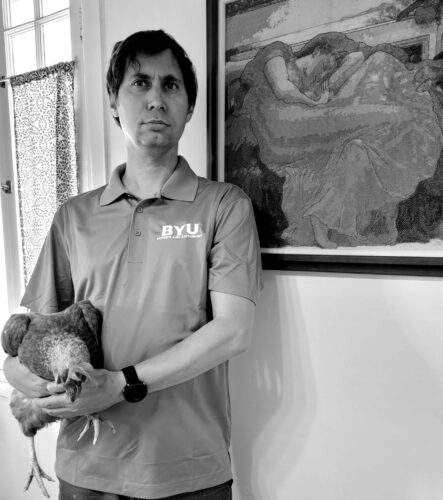It’s difficult to imagine a more efficient way to celebrate achievements.
“Wikipedia is one of the most-visited websites in the world, and the go-to resource for reference and background information,” said Christian Anderson who completed our recent Wiki Scientists course sponsored by the American Physical Society. “When STEM minorities are included in Wikipedia, their visibility immediately increases. It’s difficult to imagine a more efficient way to celebrate achievements from all kinds of folks. As a physicist (one of the majors with the fewest women) at BYU (one of the least ethnically diverse schools in America), it’s easy to think only white men do what I do; Wikipedia is a powerful counter to those sorts of historically-deterministic blinders.”

Christian Anderson is a marine biologist and theoretical physicist, who also studies Finnish in his spare time. When he realized that the English Wikipedia was missing a biography of Dr. Eugenie Lisitzin, an oceanographer who was the first Finnish woman to earn a PhD in physics, he figured he was a great person to write it.
“I’ve been strongly committed to increasing minority involvement in STEM for decades. I have also taught myself a bit of wiki editing, and I thought this was a fantastic opportunity to combine both interests. I was delighted to find a physical oceanographer (my two fields) who broke so many gender barriers in her own country, and that I happened to have rudimentary abilities in the uncommon language containing most of the secondary sources about her. But what really made me feel like this was meant to be was late in the project, I stumbled upon a list of visiting scholars to my own former department (The Scripps Institution of Oceanography at UCSD), and learned that Lisitzin had spent a six month sabbatical on the same campus as me in 1959.”
There are a few reasons a biography might not exist on Wikipedia yet. The figure may not meet Wikipedia’s requirements for notability. There may not be enough secondary sources about them to cite. Or, (and what is very often the case), someone simply has not taken the time to write it.
The argument could definitely be made for Dr. Lisitzin’s deserving an article. But at first, Christian had some trouble tracking down enough online resources about her.
“I understand Wikipedia’s policy of referencing secondary sources to maintain standards of notability. Unfortunately, one side effect of this policy is that it causes Wikipedia to reflect societal bias against women and minorities in science,” said Christian. Luckily, he knew where else to look.
“I sought help from some wonderful people. Ari Miettinen at the University of Helsinki dug Dr. Lisitzin’s 1927 dissertation out of the archives and scanned the first five pages for me, so I could find out who her advisor was. I also discovered that her future boss at the Institute of Marine Science was on her committee, explaining why she shifted from particle physics to oceanography. Researchers in the Finnish Genealogy Facebook group and at the Family History Library in Salt Lake City were able to help me find the family’s immigration records from Germany (where her father was a railway engineer) to Finland, and her only obituary in a small local newspaper. Without their help, I wouldn’t have known even where she died, much less that an Act of Parliament was passed in 1961 to allow her to become the first director of a federal science ministry when the current director took a two year sabbatical.”
It’s exactly this kind of collaboration, crowd-sourcing, and passionate follow-through that makes Wikipedia work and makes it wonderful. And having the support of our Wiki Scientists course gave Christian some added skills and confidence, even though he had been editing Wikipedia since 2014.
“I had written two articles before taking this class, but learned something new every meeting, including how to customize my personal profile, all about the wiki journal, community standards in talk pages, where to get help, and so on. Will Kent was an excellent discussion leader.
“I love Wikipedia as a source, and am always delighted when I get to contribute. After the class, I went back and improved an article I created in 2016 about Ludwig Berwald, a brilliant Jewish mathematician in Vienna who submitted his last paper for publication the morning before Nazis took him to the concentration camp where he would die. That is a powerful story, and one that deserves the best writing I can bring to it.”
“Ludwig and Lisitzin show that even with the millions of articles already available, significant and inspiring stories are still waiting to be told. I’m delighted that I now have the skills and opportunity to share them via Wikipedia.”
Sign up for an open course at learn.wikiedu.org or explore sponsoring a customized course like the American Physical Society did at partner.wikiedu.org.
